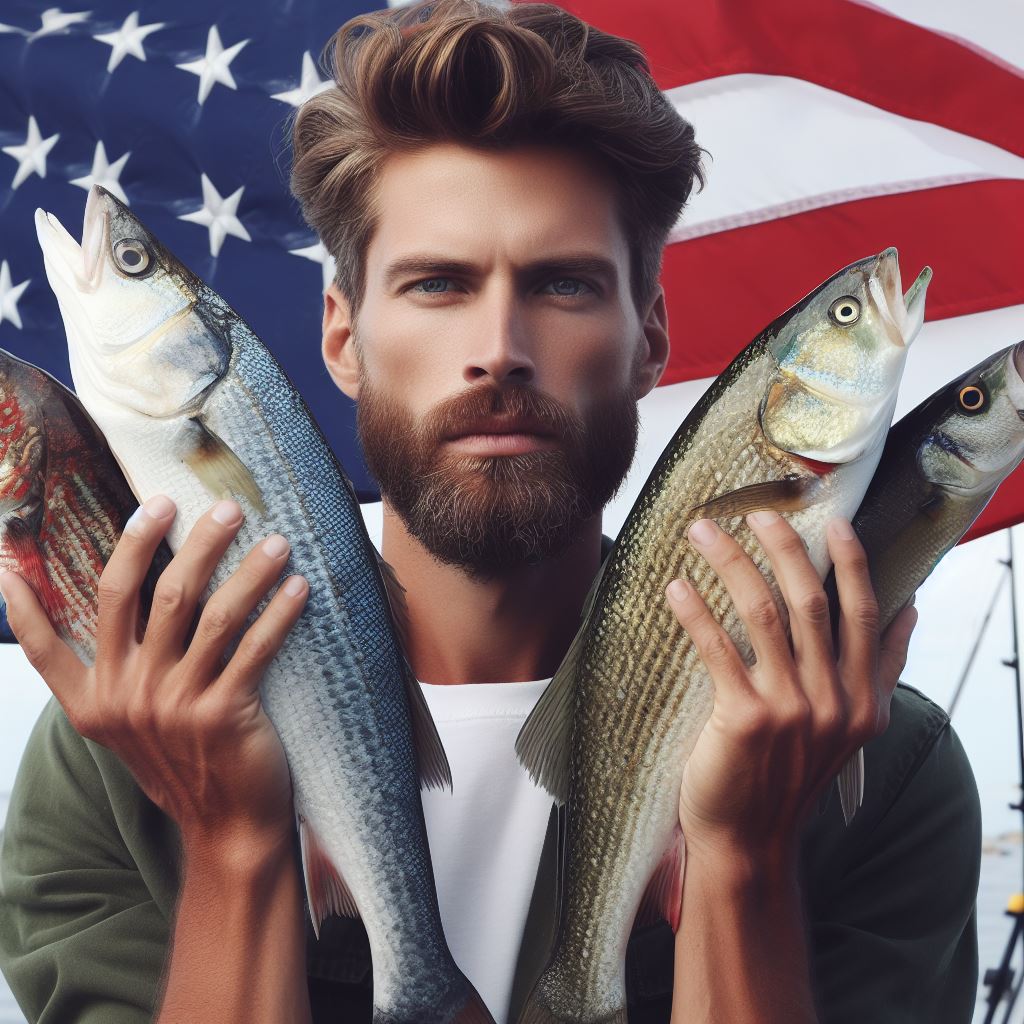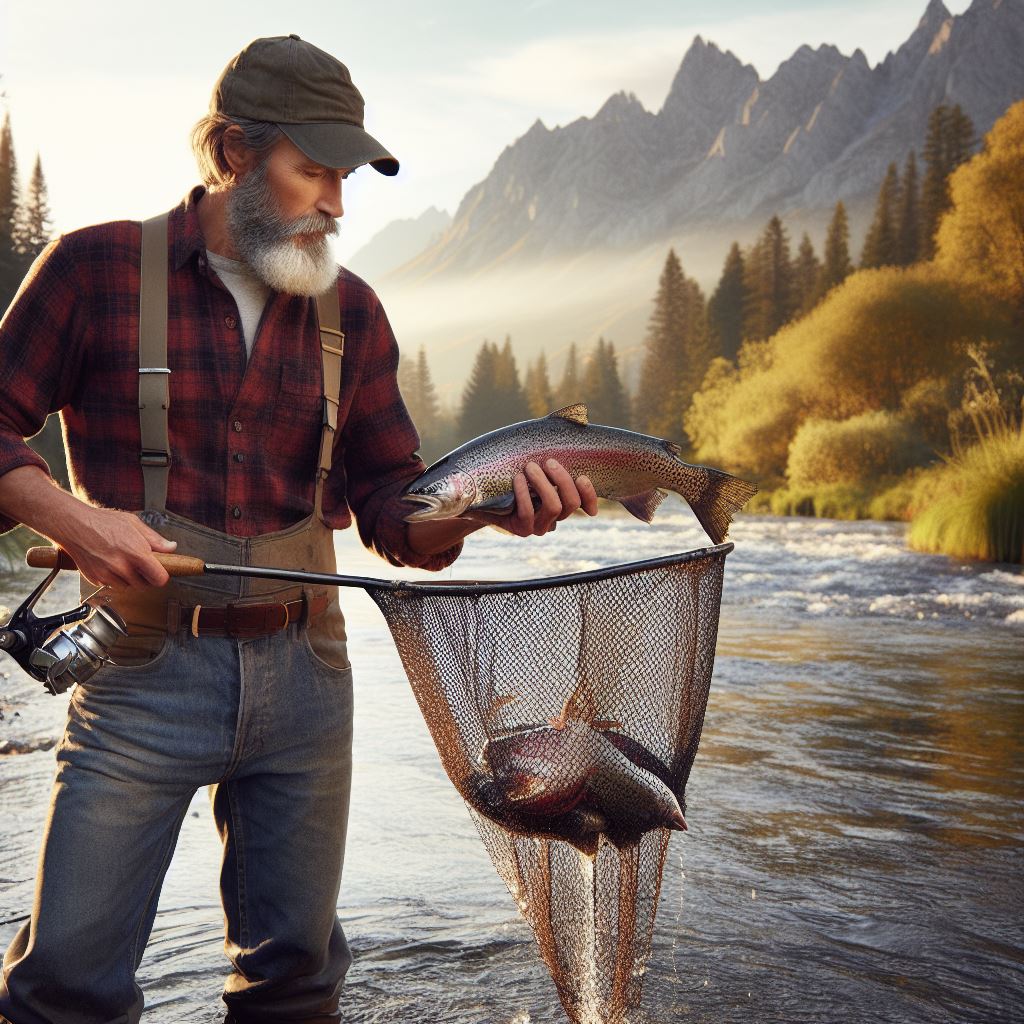Introduction
Overfishing is a significant issue that greatly affects US waters and the marine ecosystems within them.
Fisheries and marine ecosystems play a crucial role in providing food, income, and recreational activities for people.
However, the definition of overfishing implies the excessive catching of fish that exceeds the population’s ability to reproduce.
This leads to a decline in fish stocks, ecosystem imbalances, and impacts on the economy and food security.
Marine ecosystems are incredibly important as they support a diverse range of species, contribute to the overall health of the planet, and provide essential services to humans.
Fisheries are not only a source of livelihood for fishermen but also contribute to the economy through fish exports and tourism.
Overfishing poses a serious threat to the delicate balance of these ecosystems and the sustainability of fish populations.
Without effective management and conservation efforts, overfishing can lead to the collapse of marine ecosystems, the loss of biodiversity, and negative consequences for communities that rely on fisheries.
Therefore, it is crucial to address the issue of overfishing and explore potential solutions to ensure the long-term health and productivity of US waters.
Overview of the Current State of US Waters
The state of US waters is currently being threatened by the issue of overfishing, which is having detrimental effects on the environment, economy, and coastal communities.
Statistics on Overfished Species and Declining Fish Stocks
- According to recent studies, over 90% of the world’s fish stocks are either fully exploited, overexploited, or depleted.
- In the US, around 20% of fish stocks are currently overfished, with some species being on the verge of collapse.
- Commercially important species like Atlantic cod, red snapper, and bluefin tuna have experienced significant declines in population.
- Furthermore, around 40% of the fish species that have been assessed in US waters have been declared as overfished.
Impacts on the Environment, Economy, and Coastal Communities
- Environmental Impact: Overfishing disrupts the delicate balance of marine ecosystems, leading to ecological imbalances and the loss of biodiversity. It disrupts food chains and can cause the collapse of entire ecosystems.
- Economic Impact: Overfishing negatively affects the fishing industry as declining fish stocks result in reduced catches and lower profits. This leads to job losses and economic hardships for fishing communities.
- Impact on Coastal Communities: Fishing is not just a livelihood but also a way of life for many coastal communities. Overfishing jeopardizes their cultural heritage and traditions, threatening their socio-economic well-being.
- Loss of Food Security: Overfishing limits the availability of fish as a food source, depriving millions of people of an essential protein source and exacerbating global food insecurity.
- Destruction of Habitat: Certain fishing methods used to maximize catches, such as bottom trawling, destroy sensitive marine habitats like coral reefs and seafloor ecosystems.
- Threat to Endangered Species: Overfishing puts endangered species at an elevated risk, as they are often caught unintentionally in fishing nets or introduced to foreign ecosystems through fish trade.
Solutions Ahead
To address the issue of overfishing and its devastating consequences, several proactive measures can be taken:
- Setting Catch Limits: Implementing strict regulations on the amount of fish that can be caught to prevent overexploitation.
- Fishing Quotas: Allocating specific fishing quotas to ensure sustainable fishing practices and prevent excessive fishing pressure.
- Implementing Fisheries Management Plans: Developing comprehensive plans that promote the recovery of overfished stocks and protect vulnerable species.
- Enhancing Monitoring and Enforcement: Increasing surveillance to detect and prevent illegal fishing activities, ensuring compliance with fishing regulations.
- Implementing Marine Protected Areas (MPAs): Designating specific areas where fishing is restricted to allow fish populations to recover and protect critical marine habitats.
- Promoting Sustainable Fishing Practices: Encouraging the use of selective fishing gear and techniques that minimize bycatch and prevent habitat destruction.
By implementing these solutions, it is possible to mitigate the damages caused by overfishing and restore the health and productivity of US waters for future generations.
Read: Diverse Techniques: Traditional vs. Modern Fishing Methods
Causes of Overfishing in US Waters
Lack of Effective Fisheries Management
- Inadequate fisheries management policies contribute to overfishing in US waters.
- Failure to properly regulate fishing activities allows for excessive exploitation of fish populations.
- Insufficient monitoring and enforcement of fishing quotas and size limits exacerbate the problem.
- Ineffective collaboration between government agencies, scientists, and the fishing industry hampers conservation efforts.
- Lack of funding and resources for research and management initiatives further impedes sustainable practices.
Illegal, Unreported, and Unregulated Fishing (IUU)
- IUU fishing, which involves activities that violate fishing regulations, is a significant factor leading to overfishing.
- Unlicensed fishing vessels engage in the unauthorized capture of fish, undermining conservation measures.
- Failure to report catches accurately results in an inaccurate assessment of fish stocks, hindering sustainable management.
- The black market for illegally caught fish drives up demand, contributing to the depletion of species.
- Inadequate international cooperation and coordination allow IUU fishing to persist, impacting US waters.
Technological Advancements and Increased Fishing Efforts
- Technological advancements in fishing gear and vessels have enabled more efficient and widespread fishing practices.
- Increased fishing efforts, driven by economic incentives, lead to overfishing and the destruction of marine ecosystems.
- Modern technologies such as sonar devices and satellite tracking systems make it easier to locate fish populations.
- Overcapacity in fishing fleets, caused by advances in efficiency, results in excessive pressure on fish stocks.
- The use of destructive fishing methods, like bottom trawling, further exacerbates the negative impacts on marine habitats.
Solutions Ahead for Overfishing in US Waters
Implementing Effective Fisheries Management
- Strengthening fisheries management through science-based policies and regulations is crucial.
- Setting and enforcing sustainable catch limits and size restrictions help prevent overfishing.
- Improved data collection and monitoring systems enable accurate assessments of fish populations.
- Collaborative efforts between government agencies, scientists, and the fishing industry promote sustainable practices.
- Increasing funding and resources for research, monitoring, and enforcement contribute to better management outcomes.
Combating Illegal, Unreported, and Unregulated Fishing
- Enhancing international cooperation and coordination helps combat IUU fishing in US waters.
- Implementing stricter regulations, surveillance, and penalties discourages illegal fishing activities.
- Enforcing mandatory reporting and traceability systems ensures accurate monitoring of catches.
- Raising awareness about the impact of IUU fishing on ecosystems and economies discourages demand for illegal fish.
- Promoting sustainable fishing practices and supporting local communities provide alternatives to illegal fishing activities.
Addressing Technological Advancements and Fishing Efforts
- Regulating and controlling technological advancements in fishing gear and vessels is essential to prevent overfishing.
- Limiting fishing capacity through license restrictions and vessel buyback programs helps maintain balance.
- Promoting the use of selective and sustainable fishing methods minimizes the ecological impact.
- Establishing marine protected areas and no-fishing zones helps in the recovery of depleted fish stocks.
- Supporting research and innovation to develop alternative fishing techniques that reduce bycatch and habitat damage.
In a nutshell, overfishing in US waters is primarily caused by the lack of effective fisheries management, illegal fishing practices, and technological advancements.
Addressing these issues through improved regulations, increased enforcement, and sustainable fishing practices is essential to mitigate the detrimental effects on marine ecosystems.
Collaborative efforts involving governments, scientists, and the fishing industry, along with international cooperation, are crucial in ensuring the long-term sustainability of fish populations and the health of US waters.
Consequences of overfishing
Overfishing in US waters leads to various negative consequences, affecting both the marine ecosystem and human communities.
1. Disruption of Marine Food Chains
Overfishing can cause a disruption in marine food chains as certain fish species are targeted more than others.
When a top predator species, such as sharks, is overfished, it disrupts the entire food chain.
Without enough sharks, the population of their prey like smaller fish increases, leading to imbalances within the ecosystem.
Transform Your Career Today
Unlock a personalized career strategy that drives real results. Get tailored advice and a roadmap designed just for you.
Start Now2. Loss of Biodiversity
Overfishing can result in the loss of biodiversity as certain fish species are unable to reproduce and maintain healthy population sizes.
This loss of biodiversity not only affects the overall health of the marine ecosystem but also reduces the availability of diverse seafood options for consumers.
Economic Impact on Fishing Industries and Related Sectors:
Overfishing has severe economic implications on fishing industries and related sectors.
When fish stocks decline, fishermen struggle to catch enough to sustain their businesses.
This leads to reduced incomes, job losses, and potential bankruptcy.
Additionally, industries dependent on fishing, such as seafood processing and distribution, also suffer from decreased supply and demand.
3. Social and Cultural Impact on Fishing Communities:
Fishing communities, particularly those reliant on traditional fishing practices, face social and cultural challenges due to overfishing.
As fish populations dwindle, these communities may have to search for alternative livelihoods, which often means leaving behind generations of fishing traditions and local knowledge.
The loss of these practices can deeply impact the cultural identity and social cohesion of these communities.
To sum it up, overfishing in US waters has far-reaching consequences that impact marine ecosystems and human communities.
The disruption of marine food chains and loss of biodiversity threaten the delicate balance and long-term sustainability of the ocean.
Simultaneously, the economic and social impacts on fishing industries and communities can be devastating.
It is crucial to address overfishing through sustainable fishing practices, stricter regulations, and community engagement to protect both the environment and the livelihoods of those who depend on the sea.

Efforts and Initiatives to Combat Overfishing
In order to protect and restore the health of US waters, several efforts and initiatives have been undertaken to combat overfishing.
These measures aim to promote sustainable fishing practices, protect marine habitats, and ensure the long-term viability of fish populations.
Implementation of Sustainable Fishing Practices
- Regulations and policies have been put in place to regulate fishing activities and prevent overexploitation of marine resources.
- Fisheries are encouraged to adopt sustainable fishing practices such as using selective gear to reduce bycatch and avoiding overfishing certain species.
- Educational campaigns and training programs are conducted to raise awareness among fishermen about the importance of sustainability.
Establishment of Marine Protected Areas (MPAs)
- MPAs are specific areas in the ocean where fishing activities are restricted or prohibited to allow fish populations to recover.
- These protected areas serve as crucial breeding grounds and nurseries for various marine species, ensuring their survival and replenishment.
- By creating MPAs, the biodiversity and resilience of marine ecosystems are enhanced, contributing to the overall health of US waters.
International Agreements and Regulations
- Recognizing the transboundary nature of marine resources, international agreements and regulations have been established.
- These agreements aim to control fishing efforts, regulate the trade of endangered species, and promote responsible fishing practices globally.
- The United States plays an active role in these international collaborations to ensure the sustainable management of shared fish stocks.
Collaborative Efforts Between Government, Fisheries, and Environmental Organizations
- Government agencies, fisheries, and environmental organizations work together to develop comprehensive strategies and policies.
- Through collaboration, they aim to balance the needs of the fishing industry with the conservation and preservation of marine ecosystems.
- These collaborative efforts involve data sharing, scientific research, and the implementation of effective management plans.
Ultimately, addressing the issue of overfishing in US waters requires a multi-faceted approach.
Efforts and initiatives such as implementing sustainable fishing practices, establishing marine protected areas, and promoting international agreements and regulations are essential.
Additionally, collaborative efforts between government, fisheries, and environmental organizations are crucial for ensuring the long-term sustainability of US fisheries and the preservation of marine ecosystems.
Read: Impact of Climate Change on US Fishing Grounds
Transform Your Career Today
Unlock a personalized career strategy that drives real results. Get tailored advice and a roadmap designed just for you.
Start NowGain More Insights: Understanding Entomology Grants and Funding Opportunities
Successful Solutions and Their Impact
Case Studies of Recovered Fisheries
- The haddock fishery in the Gulf of Maine is an example of a successful recovery.
It was overfished in the 1990s, but strict management measures helped the stock rebuild. - The Atlantic swordfish fishery is another case study showcasing recovery from overfishing.
By implementing fishing quotas and gear restrictions, the swordfish population rebounded.
Positive Outcomes from Sustainable Practices
- The use of selective fishing gear, such as turtle excluder devices (TEDs), has reduced
the bycatch of endangered sea turtles and other non-target species. - Adoption of marine protected areas (MPAs) has shown significant positive impacts by providing
safe havens for fish populations to grow and replenish, leading to healthier ecosystems.
Economic Benefits and Job Creation in Sustainable Fishing Industries
- The implementation of sustainable fishing practices has led to increased long-term profits
for fishermen. By maintaining healthy fish populations, fishermen can continue their livelihoods. - The growth of sustainable fishing industries has created new employment opportunities,
ranging from fishery management to eco-tourism, contributing to local and regional economies.
In review, successful solutions in addressing overfishing have demonstrated the potential for
recovering fish populations and promoting sustainable practices.
The case studies of the haddock and Atlantic swordfish fisheries showcase the effectiveness of strict management measures and fishing restrictions.
These success stories highlight the importance of proactive measures to prevent
overfishing and rebuild depleted stocks.
Implementing sustainable practices, such as selective fishing gear and marine protected areas,
have also shown positive outcomes in terms of reducing bycatch and preserving marine ecosystems.
Moreover, the adoption of sustainable practices not only benefits the environment but also brings
economic advantages.
By maintaining healthy fish populations, sustainable fishing industries can
generate increased long-term profits for fishermen.
Additionally, the growth of these industries
creates new job opportunities and contributes to local and regional economies.
Overall, understanding the impact of successful solutions, such as recovery case studies,
sustainable practices, and economic benefits, underscores the significance of managing
fisheries effectively.
By prioritizing sustainable fishing practices, we can ensure the long-term
health and productivity of our oceans and safeguard the livelihoods of those dependent on them.
Read: Safety Protocols and Training for American Fishermen
Challenges and obstacles to overcome in order to achieve sustainable fishing
- Resistance from fishing industries and stakeholders: The fishing industry may resist changes that could potentially impact their profitability.
- Limited resources and funding for enforcement and monitoring: Without sufficient resources, it becomes difficult to enforce regulations and effectively monitor fishing activities.
- Need for international cooperation and stronger regulations: Overfishing is a global issue, requiring cooperation among countries to implement effective regulations.
Resistance from fishing industries and stakeholders
Fishing industries and stakeholders often resist efforts to implement sustainable fishing practices due to economic concerns.
They may fear that stricter regulations could reduce their catch or increase costs, negatively impacting their profits.
For example, some fishing companies continue to use outdated, unsustainable fishing techniques, such as bottom trawling, which causes extensive damage to marine habitats.
Despite evidence suggesting the need for change, resistance from these industries slows down progress towards sustainable fishing.
Limited resources and funding for enforcement and monitoring
Effective enforcement and monitoring are essential for ensuring sustainable fishing practices.
However, limited resources and funding often hinder the ability to carry out these crucial activities.
Monitoring fishing activities requires personnel, equipment, and technology to track vessel movements and verify compliance with regulations.
Without sufficient resources, it becomes challenging to identify illegal or unsustainable fishing practices, leading to overfishing in many areas.
Furthermore, the enforcement of regulations relies on patrol vessels and surveillance systems, which require funding to operate and maintain.
Transform Your Career Today
Unlock a personalized career strategy that drives real results. Get tailored advice and a roadmap designed just for you.
Start NowInsufficient resources in this area often result in inadequate enforcement, allowing illegal fishing activities to persist.
Need for international cooperation and stronger regulations
Overfishing is not confined to the waters of a single country.
It is a global issue that requires collaboration and coordination among nations to address effectively.
International cooperation is necessary for establishing strong regulations that can be universally enforced.
These regulations should include measures such as setting catch limits, protecting important breeding grounds, and banning destructive fishing techniques.
However, achieving consensus on international fishing regulations can be a challenge.
Countries often have different priorities and economic interests, impeding progress towards implementing stricter measures to promote sustainable fishing practices.
Additionally, stronger regulations need to be developed to address emerging threats to marine ecosystems, such as bycatch of non-target species, habitat destruction, and the use of harmful fishing gear.
On a final note, achieving sustainable fishing practices faces several challenges and obstacles, including resistance from fishing industries, limited resources for enforcement and monitoring, and the need for international cooperation and stronger regulations.
Overcoming these hurdles is crucial to ensure the health and longevity of our marine ecosystems and the livelihoods of those who depend on them.
(Note: HTML tags have been included for formatting purposes only and may need to be removed before publishing the blog Section.)
Read: The Cultural Significance of Fishing in American Society
Conclusion and Call to Action
In closing, addressing overfishing in US waters is of utmost importance.
It not only affects the marine ecosystem but also has severe implications for the economy and food security.
We have discussed how overfishing disrupts the delicate balance of marine ecosystems, leads to the decline of fish populations, and threatens the existence of certain species.
However, individuals play a crucial role in reversing this trend.
By making sustainable seafood choices, we can create a demand for responsibly sourced fish and help conserve the marine environment.
It is also essential to support and advocate for sustainable fishing practices.
This includes promoting regulations and policies that protect fish stocks, marine habitats, and promote responsible fishing methods.
Together, we can envision a future where US waters thrive with healthy fish populations.
Transform Your Career Today
Unlock a personalized career strategy that drives real results. Get tailored advice and a roadmap designed just for you.
Start NowBy taking action today, we can leave a legacy of sustainability and ensure that future generations can enjoy the bounties of the sea.
Take a stand for our oceans
- Choose sustainable seafood options and encourage others to do the same.
- Stay informed about fisheries management and support organizations working towards sustainable fishing practices.
- Engage with policymakers and advocate for stronger regulations that protect marine ecosystems.
- Spread awareness about the importance of addressing overfishing and its impacts on US waters.
Let’s work together to conserve our oceans and create a healthier future for our planet.




